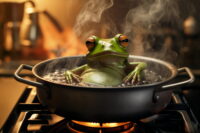Why don’t you pull up a chair, pour yourself a six-ounce glass of a robust red wine – maybe a Monte Rosso zinfandel or a Robert Kamen cabernet – and picture a perfectly-grilled, medium rare filet of grass-fed beef. Yum, right?
Well, basically, that’s what Measure J, on the November Sonoma County ballot is all about.
Now, there are those who will righteously scoff and insist that’s not what it’s about, at all. It is, the scoffers will angrily tell you, about protecting family farmers by banning concentrated animal feeding operations (CAFOs) that pollute Sonoma County waterways, foul the air, breed dangerous pathogens, increase global warming and cruelly contain livestock animals in inhumane and illegal conditions.
OK, fine. But let’s be really honest. If you’re going to eat a cow, you’re going to either be in a major state of denial, or you’re going to be at peace with a really brutal reality. Either way, you’d probably rather not think about it, right?
I eat cow. I do. Occasionally pig, and a lot of chicken. I would subsist happily on wild-caught salmon 24-7 if I could afford it. But I like cow, as long as it’s grass fed. That’s my self-righteous little beef-eater caveat.
There are all kinds of reasons not to eat cow. The water it takes to grow enough feed for a (non-grass fed) steer to grow big enough to eat is staggering. For a 1,000-pound steer, it takes an estimated 4,700 gallons of water to produce a single pound of beef in California. By comparison, it takes about 260 gallons of water to grow a pound of soybeans. And then there are the cow farts and methane belches. Hello climate change.
Which brings us to the killing part. Most of us would go out of our way to save the life of a horse, a dog, a cat, a hamster, even a pet rat. But we would readily sink our teeth into the butchered butt of a cow. And yet, most of us know that if we had to kill that cow ourselves, and carve up its carcass, or starve, we would probably starve.
Measure J, if it passes, will impose strict limits on the numbers of animals – according to species – that can be kept on a single farm in Sonoma County. Smaller farms, the proponents insist, will mean more and smaller family farms, less pollution and more humane conditions for farm animals – primarily cows, chickens, ducks, and pigs.
But there are already strict regulations protecting the welfare of all these animals in California, with periodic inspections, and if those regulations are being violated on Sonoma County farms, should they not be reported and should not legal action be taken? And, by most accepted definitions, there are few if any so-called factory farms in Sonoma County, with the possible exception of one or two massive poultry operations.
And here’s the thing. There is a clear ulterior motive behind Measure J. Its proponents are members of a radical animal rights organization called, Direct Action Everywhere, or DxE. DxE members have been aggressively active invading livestock farms and taking videos of inhumane conditions. Some of them have been arrested and jailed. Fine.
But let’s be clear about the real purpose of Measure J. It’s to try to make us stop eating animals. It’s an effort to get our collective attention. And if it succeeds, it will still fail. Because as much and as long as I meditate and pay attention to the ragged edges of my soul, and as uncomfortable as I am at times chewing the body of a sentient being, I’m not yet ready to stop. And I’m not alone.
Measure J, a wide body of expert opinion believes, will do serious harm to Sonoma County farms – many if not most of which, are family farms. Violations of animal welfare law are not cause to do long term harm to Sonoma County agriculture. Measure J is a wolf in cow’s clothing.






As a vegan of three decades, at first I jumped on the J bandwagon — until I had this thought: Would it discourage many of our generations-old farmers and ranchers from continuing their family’s traditional land use, encouraging them to use their collective political clout to change the county’s zoning laws so that they could sell off their lands to developers? Having lived in this county for 51 years, the last thing I want is more development. So, even though I abhor the killing of animals, I’d rather vote No on J and leave alone all of our county’s farmers and ranchers so that their family’s future is secure, and so is our agricultural land.
There are other choices for the land than as animal torture prisons. Agriculture would provide food and jobs.
“Violations of animal welfare law are not cause to do long term harm to Sonoma County agriculture.” Hmmm. If “family farmers” didn’t violate animals welfare laws, Measure J might never have gotten the thousands of signatures needed to be placed on the ballot.
No laws were ever broken. DxE used lies and confusion to get signatures. Their goal is to make eating meat illegal worldwide by year 2055, evening banning owning pets by year 2040. This measure is their ‘political’ component to bankrupt agriculture. As they now the whole system depends on one another. The other two actions that have planned are protesting & getting this all done ‘by any means necessary’. Which is why the face of DxE cult is already going to jail for 20 years, for murdering hundreds of ducks by spreading blu flu onto them. I honestly wonder now if this group isn’t being paid to do this by a nation that wants to kills us or take over the United States 😞
Wayne Hsiung of DxE was sentenced to 90 days in jail and 2 years of probation for trespassing and conspiracy, not 20 years. He was not tried nor convicted for spreading bird flu. You can read this in Northern California Public Media published November 2nd, 2023.
Facts are often ignored. If one reads all the No on J on social media, one will find some interesting “alternate facts”. Vegan diets with too many “super foods” will make you sick. People who fed their cats vegan diets were horrified when their cats died and blame it on vegan diets and not themselves. (When we all know cats are carnivores and people are omnivores.) There are no CAFOs in Sonoma county. (There are 2 poultry operations with 7 locations each that are not family farms, with over 1.5 million animals each in their combined and confined operations.) But, of course perhaps the Idiot and I are vegans or vegetarians so anything we say can not be a fact.
This is a red herring, as they are no violations of animal welfare laws. You publicly stated, in the PD comments, what the real goal of Measure J is. And that is confirmed by the fact that the seed money for the ballot measure comes from Karuna/Ahimsa Foundations and Nicholas Owen Gunden (billionaire venture capitalists in the Lab Grown Meat industry). Your own words in the comments section: “But Measure J is not the real threat to farming. Smart ag interests will begin investing in the latest FDA-approved technology that is now “growing” meat in the laboratory — yes — to expand it to commercial levels. When steaks, pork chops and chicken breasts can be produced without slaughtering living creatures, “farms” as we know them will cease to exist.”
As The Sun’s “Letter From the Editor” (October 3, 2024) makes clear, Measure J is already well on the way to achieving its “real purpose”, exposing the “major state of denial” driving opposition to this youth-led initiative. Measure J forces privileged members of my older generation to confront our inherited ethical blind spots, our increasingly catastrophic environmental excesses, and our “self-righteous little beef-eater” hypocrisies. On November 5 we have a choice to make. We will either live up to our personal values and reject the ag-systemic failings that Measure J begins to confront, or like Editor Bolling take this all too personally, and attempt to justify our votes with a Nuremberg-like defense: “I’m not ready to stop. And I’m not alone.”
“No” is a vote for the past. Vote “Yes on J” for our children’s future.
💯 agree!
I wanted to write a comment, but you said it all so perfectly!
I hope a lot of people will read your comment.
Thank you for putting things in perspective!
“The region’s rural heritage and progressive politics will collide next month when Sonoma County residents vote on a first-of-its-kind ballot measure…
It’s poised to generate the highest campaign spending of any ballot measure in Sonoma County history, with about $2 million in contributions made for and against — the vast majority of which has been spent by industry in opposition.”
https://www.vox.com/future-perfect/377096/sonoma-county-denver-factory-farming-slaughterhouse-ban-ballot-measures